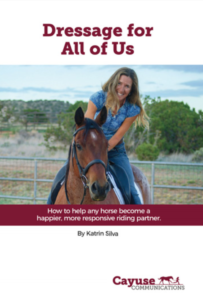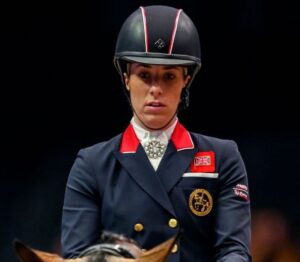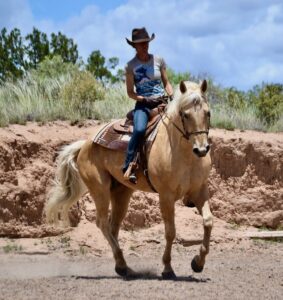 Editor’s Note: Best Horse Practices Summit presenter Katrin Silva grew up riding dressage in Germany before moving to the United States at age 19 to learn to ride Western. She’s been riding both disciplines for the last 20 years and is a regular guest columnist for Cayuse Communications. The author of Dressage for All of Us: How to Help Any Horse Become a Happier, More Responsive Riding Partner and the forthcoming Ride with Feel: A Guide for the Rest of Us lives in New Mexico where she works with dressage and Western clients.
Editor’s Note: Best Horse Practices Summit presenter Katrin Silva grew up riding dressage in Germany before moving to the United States at age 19 to learn to ride Western. She’s been riding both disciplines for the last 20 years and is a regular guest columnist for Cayuse Communications. The author of Dressage for All of Us: How to Help Any Horse Become a Happier, More Responsive Riding Partner and the forthcoming Ride with Feel: A Guide for the Rest of Us lives in New Mexico where she works with dressage and Western clients.
Katrin Silva writes:
Yes, I have seen the video of Charlotte Dujardin, arguably the world’s best dressage rider, whipping a student’s horse during a lesson. Yes, it is disturbing – especially because of the casual attitude it reveals about using the whip with force and gusto, again and again and again.
This is no big deal for Charlotte, who keeps whipping, even when the horse clearly does not understand what his response is supposed to be. It’s no big deal for the person filming, either. She is chuckling, sounding amused at the sight.
And, sadly, it’s not even a big deal to the horse, who is held tight in front and whipped on the hind end at the same time, which gives him nowhere to go. Most horses in my program would rear or bolt or buck if I treated them like this. I would not blame them. This horse kicks out a few times, then looks resigned. For him, pain and confusion are normal facts of life. This is just how things are.
 Using the whip from the ground to help a horse figure out piaffe or other collected movements has a long tradition in dressage. It is not automatically abuse. The whip can be handled, like any tool, lightly, with tact and finesse. But here, the whip is used to cause pain. Here, the whip is used because Charlotte is frustrated with a horse who does not do what she expects of him, even though he does not know what she expects of him.
Using the whip from the ground to help a horse figure out piaffe or other collected movements has a long tradition in dressage. It is not automatically abuse. The whip can be handled, like any tool, lightly, with tact and finesse. But here, the whip is used to cause pain. Here, the whip is used because Charlotte is frustrated with a horse who does not do what she expects of him, even though he does not know what she expects of him.
No, it is not acceptable.
No, it is not excusable.
Yes, Charlotte should have stopped using the whip and thought about why the horse resisted. Yes, the student riding the horse could have spoken up right then.
Yes, any of the people watching the lesson should have and could have stopped what was going on.
The bigger question becomes: Why didn’t they?
Charlotte Dujardin does not exist in a vacuum. Abusive practices in equestrian sports are part of a larger pattern in the horse industry. People who abuse horses include many respected trainers and competitors at the highest level. They are not just “a few bad apples.” They are part of a culture that goes beyond Charlotte Dujardin, beyond Andreas Helgstrand, beyond dressage, beyond any particular discipline.
I’ve seen these types of training practices in Western show horses, in jumpers, in gaited horses. They are often considered normal, standard ways of making a horse do certain things or move a certain way – and the trainers who practice them pass them along to their students and assistants. When I was 19, the age of Charlotte’s student in this video, I worked for a well-respected trainer who had won multiple AQHA World Championships but used extremely abusive methods, like yanking on a horse’s head with a thin twisted-wire bit or raking their sides with rock grinder spurs.
I watched horses suffer. I participated in making them suffer. I’m not proud of this, but I believed what I was told: If I wanted to make it in the horse world, I needed to toughen up and play the game.
Thank goodness, I eventually walked away.

Katrin Silva
Thank goodness, I found other, better, role models. I was lucky. I could easily have ended up on the dark side of the equestrian universe.
Abusive trainers could not continue to do what they do without the network of enablers and condoners of their abusive practices: judges who reward spectacular movement over correct riding, students who believe questioning their coach is a sign of disrespect, professional riders and grooms afraid of losing their jobs, owners who like to brag about winning and threaten to take horses away from trainers who don’t win, breeders who like to sell their prospects for maximum amounts of money, spectators who gush over flashy performances on tense, anxious horses.
Do we condemn them all?
Do we cancel everyone who has ever contributed to abusive practices with any horse?
What good would that do?
Do we want to point fingers, accuse, blame, and feel self-righteous for a nanosecond, or do we want real, lasting change in the horse industry?
Here is what we need to do:
We need to change the culture around equestrian competition by modeling and supporting fairness to horses.
We need to change traditions (which does not happen overnight).
We need to have honest, industry-wide conversations about what abuse is and what it is not – and we need to develop clear guidelines around it.
We need to train our eyes to signs of tension and stress in a horse, instead of mistaking them for brilliance or collection.
We need to, as we say in German – Kehr vor der eigenen Tür – sweep outside our own front doors before pointing to the neighbors’ porch. We need to acknowledge our own lapses of judgment, our own moments of frustration with horses, our own shortcomings, our own misguided allegiance to traditions that don’t serve the horses’ best interest. If we have been a part of the horse world for long enough, we have done things we regret later, just like Charlotte Dujardin. She acknowledges this and is learning from her mistakes. We should do the same. No one is perfect.
Here is what we don’t need to do:
We don’t need to add more shame and judgment to this world. There is already too much of it going around.
Thank you for sharing your thoughts and insights. I love and couldn’t agree more with your last sentence. So very true. Your dedication to horses and compassion for both horses and humans are encouraging and inspirational!
You are exactly right. The horse industry needs to reevaluate its core values and focus on humane and fair treatment of these beautiful creatures. And, as you say, it’s not going to happen overnight. Many show disciplines, from English to Western, as well as horse racing have dark sides which routinely include abusive training methods. I believe change will happen when the owners, those who are primarily responsible for the well being of the horses, find their courage and voices and let their trainers know they will not tolerate abuse.
Well said.
I do believe the rider is now 19, was only 15 in the video – so riding with her idol and no unlikely to speak up. What Katrina speaks of is a culture.
One of abuse to achieve quick results with the horses. One of abuse of the many, mostly young girls, who aspire to be great horsemen. Sad really.
In prevention and enforcement, it’s “See something, say something.”
Wow! The world of passive push overs . Whip yourself as hard as she laid that whip on that horse, you will feel NO PAIN ! She was not beating the horse with a rod. She was using a whistle whip. Meaning you can’t make pain from that whip, it’s the sound over feel. Charlotte DID NOTHING WRONG! THAT WAS NOT ABUSE! Let’s look at the real world of horses. The one everyone is being stupid about, the WILD BLM horses. Now watch a stud work a herd or fight with another stud . Now that is pain. There isn’t a whistle whip that can cut and tear skin like a Stallion!! To say she was abusive is pathetic!!
Regina, Charlotte is NOT a trainer if she loses her temper and uses a whip on a horse over and over again. The Olympics were right in throwing her out. I watched a video where another dressage trainer in the process of whipping her mare and the mare’s reaction unseated her and as she was getting up the mare kicked out and killed her instantly. The notable dressage rider deserved it, it’s instant cause and effect. Equine sports are no longer enjoyable to watch unless the horse enjoys performing. It’s sad all way round. I’ve had the honor of caring for my horses for over 50 years and realize that if a horse understands what is being asked they want to please us. The so called trainers should be intelligent enough to figure out what the problem is before resorting to beating a horse. What an outcry would occur if a parent spanks a child. Horses are 1,000 lb 4 Year olds. I trained all my horses and never once did I do that!
Well said Alicia.
I don’t understand why you would want to whip an animal that you are so passionate about, surely there would be more pride in yourself to train without resorting
to any kind of abuse.
She admitted she did something wrong! Totally unprofessional, cruel behaviour
Very very good post – just have to add – in the horse “industry” as with every other “industry” – money and power are the drivers – but in an industry that includes animals? Sad to say, the abuse exists in every discipline (as you said).
Our treatment of animals – other species – seems to be ingrained (?) in human beings. Sorry if that sounds pessimistic, but all you have to do is look around – the treatment of animals we eat, Wildlife that we “cull” – and domestic and wild animals that we “euthanize” when they no longer please us.
I agree, Charlotte is one person – certainly NOT the only one. Pretending this is the case is pretty silly!
Very thoughtful & insightful comments. I witnessed these training methods with my first horse & was hesitant to say anything, what did I know about horses period. Then I realized that all of my horse’s issues were caused by this attitude that they must obey & be compliant to whatever we ask…they were man made. I was told my horse was spoiled & I was the problem . I found another trainer to educate me & my horse…I truly believe had we continued with first trainer my horse would probably have hurt me out of fear & frustration. We had 25:years together & he was an excellent teacher. What goes on at horse shows behind the barn is unbelievable according to someone that refuses to work shows anymore due to the cruelty they’ve seen in all disciplines.
So happy to hear your experience in finding a professional and caring trainer that kept your journey going for 25 years.
Nice article, however, Ms Dujardin is not by a very very long shot the best dressage rider. To see the very best, you must go to the very best. The Spanish Riding School in Austria. I’d like to add, the do NOT EVER abuse those magnificent Lippizaner Stallions. Perhaps it would be a good idea, to go to the source, where dressage came from, and see it PROPERLY done before expressing an opinion about her skill, or lack of skill. Ms Dujardin is mediocre at best, and her obvious lack of care , and respect for horses and other riders makes her bottom of the barrel.
Thank you for reporting the many comments from riders with knowledge about training a your horse. It truly makes me emotional about the abuse that goes on regularly. This conversation is important. Should not be hidden
Thank you!!! I just watched Valegro’s last ride with Charlotte in the seat. Yes, it was perfection. But do you want to know what I thought about the entire performance? I wondered how many times she had taken the whip to him. I envisioned it over and over. That video that was taken of her with the whip? There was a couple cackles in there like she was enjoying it. And the camera person also. There is no reason to take a whip out on a horse or other any animal. The only reason she was sorry is because it was caught on Video. She was way too comfortable with that whip. Do you think that it didn’t happen very often? Well, of course it did. To anyone finding an excuse or reason for her behavior, I say BS.